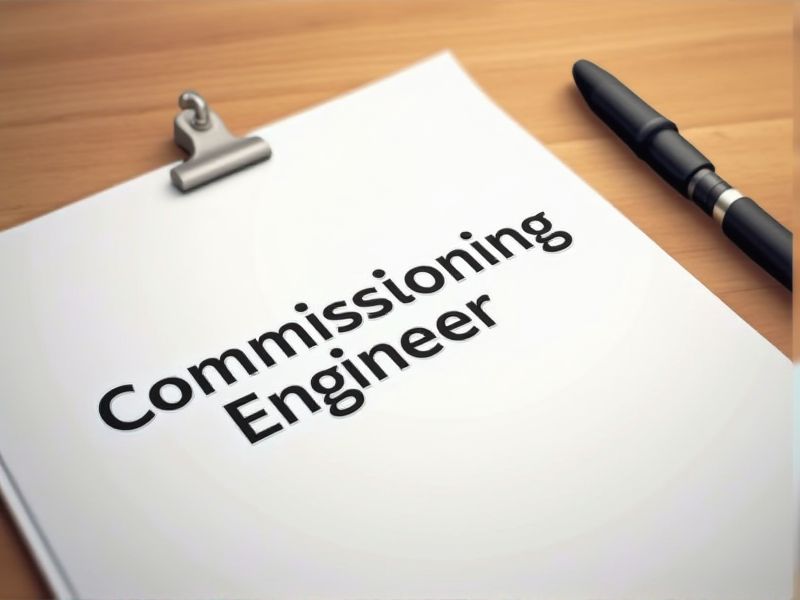
The role of a Commissioning Engineer requires a specialized blend of technical knowledge and practical skills to ensure that equipment and systems are installed and function in line with operational objectives. Certifications act as a benchmark for validating the expertise necessary to navigate complex engineering environments and troubleshoot efficiently. They equip engineers with updated industry standards and safety protocols, minimizing project risks and enhancing workflow efficiency. Below are key certifications that can be essential for a Commissioning Engineer.
Certified Commissioning Professional (CCP)
Employers often require commissioning engineers to hold the Certified Commissioning Professional (CCP) credential because it verifies their expertise and knowledge in the commissioning process. Additionally, the CCP certification helps ensure project quality and consistency, reducing potential operational problems in building systems. The CCP designation can also lead to career advancement and higher earning potential for commissioning engineers. Industry recognition of CCP certification often results in increased trust from clients and stakeholders, providing a competitive edge in project bids.
Building Commissioning Professional (BCP)
Building Commissioning Professionals (BCPs) ensure that systems and components of a building are designed, installed, and function as intended, leading to enhanced operational efficiency. BCPs provide a methodical approach to verify that the commissioning process meets the owner's requirements, thereby reducing the chances of costly rework. Lessening system failures and maintenance issues results from BCPs' involvement, which extends the lifespan of building systems and improves occupant satisfaction. Their expertise in ensuring compliance with codes and standards significantly reduces legal risks for commissioning engineers.
Certified Automation Professional (CAP)
CAP certification provides commissioning engineers with a standardized knowledge of automation systems, which aids in successful installation and testing. The credential ensures the engineer is updated with industry best practices, enhancing system reliability and efficiency. CAP-certified engineers often bring greater credibility and trust to a project, which can lead to smoother project execution. The certification helps in reducing project downtime by equipping engineers with the skills to quickly identify and solve automation-related issues.
Project Management Professional (PMP)
The PMP certification equips a Commissioning Engineer with standardized project management skills that enhance the efficiency of project execution. With PMP training, these engineers become adept at resource management, reducing project costs and delays. The credential signals a commitment to industry standards, boosting credibility and trust with clients and stakeholders. PMP-certified engineers can effectively navigate complex projects, ensuring better alignment with project goals and improved outcomes.
Professional Engineer (PE) License
A Professional Engineer (PE) License ensures that a commissioning engineer meets established standards of competency and adheres to ethical practices, which is crucial for maintaining quality and safety in project outcomes. Regulation often requires a PE License for engineers to legally sign off on engineering documents, providing accountability and authority in crucial decision-making processes. Clients and employers tend to favor commissioning engineers with a PE License, reflecting trust in their verified expertise and professional responsibility. The ability to stamp and seal engineering documents increases career advancement opportunities and positions the engineer as a leader in their industry, fostering trust and credibility in the projects undertaken.
Certified Energy Manager (CEM)
Having a Certified Energy Manager (CEM) credential equips a commissioning engineer with specialized knowledge in energy efficiency and cost-saving strategies. This expertise allows the engineer to ensure that building systems are optimized for reduced energy consumption, directly impacting cost reductions. Enhanced credibility from the CEM credential helps gain client trust, especially in projects aiming for sustainability goals. The CEM certification provides up-to-date knowledge on regulatory standards and energy management technologies, crucial for implementing best practices in engineering projects.
Six Sigma Green Belt Certification
Obtaining a Six Sigma Green Belt Certification provides a Commissioning Engineer with enhanced problem-solving skills, allowing them to effectively manage process variability. With the certification, engineers adopt data-driven approaches, leading to improved efficiency and reduced process defects. Knowledge gained from Six Sigma methods equips engineers to implement continuous improvement initiatives, optimizing project outcomes. Companies often prioritize certified individuals for roles involving quality management, making the certification valuable for career progression.
LEED Accredited Professional (LEED AP)
Commissioning engineers implementing sustainable building practices benefit from a LEED Accredited Professional (LEED AP) credential. LEED AP provides in-depth knowledge of the LEED rating system, which is crucial for ensuring compliance with sustainable building standards. Enhanced understanding of energy efficiency and environmental performance measures equips engineers to optimize building operations. This expertise assists in achieving certification goals and adds value to client projects by aligning with green building initiatives.
OSHA 30-Hour Construction Safety Certification
The OSHA 30-Hour Construction Safety Certification equips a commissioning engineer with essential knowledge to identify and mitigate potential job site hazards. This certification ensures compliance with safety regulations, reducing the risk of workplace accidents and enhancing project efficiency. A safety-certified engineer fosters a culture of safety awareness, contributing to lower injury rates and operational downtime. Clients and employers are increasingly prioritizing safety credentials, making this certification a vital factor for job prospects and career advancement in construction environments.
NEBOSH International General Certificate in Occupational Health and Safety
A NEBOSH International General Certificate equips a Commissioning Engineer with essential knowledge to identify and manage workplace hazards, significantly enhancing safety during project execution. Understanding global health and safety standards allows for improved compliance with international regulations, ensuring projects meet requisite legal requirements. The training fosters a proactive safety culture, reducing the risk of accidents and incidents that could impact project timelines and costs. Enhanced safety skills and knowledge can also improve career prospects, as employers prioritize hiring professionals well-versed in health and safety standards.
Summary
When you earn certifications as a Commissioning Engineer, your technical proficiency and industry credibility can significantly enhance. This increased competence often translates into stronger trust and responsibility from employers, potentially leading to advanced career opportunities. With these credentials, you may also qualify for higher compensation due to the specialized skills you bring. Being certified can differentiate you in the market, making you a preferred choice for complex projects.
